
Do Not Adjust Your Set (DNAYS) is a British television series produced originally by Rediffusion, London, then, by the fledgling Thames Television for British commercial television channel ITV from 26 December 1967 to 14 May 1969. The show took its name from the message that was displayed when there was a problem with transmission or technical difficulties.

Victoria Wood was an English comedian, actress, lyricist, singer, composer, pianist, screenwriter, producer and director. Wood wrote and starred in dozens of sketches, plays, musicals, films and sitcoms over several decades and her live comedy act was interspersed with her own compositions which she performed at the piano. Much of her humour was grounded in everyday life and included references to activities, attitudes and products that are considered to exemplify Britain. She was noted for her skills in observational comedy and in satirising aspects of social class.

Not the Nine O'Clock News is a British television sketch comedy show which was broadcast on BBC2 from 1979 to 1982. Originally shown as a comedy alternative to the Nine O'Clock News on BBC1, it features satirical sketches on then-current news stories and popular culture, as well as parody songs, comedy sketches, re-edited videos, and spoof television formats. The programme features Rowan Atkinson, Pamela Stephenson, Mel Smith, and Griff Rhys Jones, as well as Chris Langham in the first series.

Thames Television, commonly simplified to just Thames, was a franchise holder for a region of the British ITV television network serving London and surrounding areas from 30 July 1968 until the night of 31 December 1992. Thames Television broadcast from 9:25 Monday morning to 5:15 Friday afternoon at which time it would hand over to London Weekend Television (LWT).
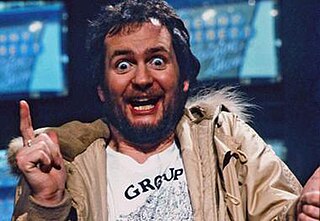
Kenny Everett was an English radio DJ and television entertainer. After spells on pirate radio and Radio Luxembourg in the mid-1960s, he was one of the first DJs to join BBC Radio's newly created BBC Radio 1 in 1967. It was here he developed his trademark voices and comical characters which he later adapted for television.
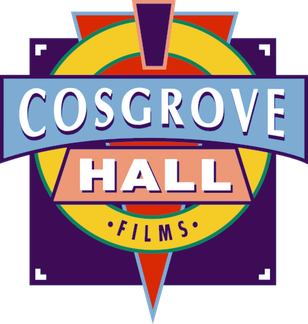
Cosgrove Hall Films was an English animation studio founded by Brian Cosgrove and Mark Hall; its headquarters was in Chorlton-cum-Hardy, Manchester. Cosgrove Hall was once a major producer of children's television and animated programmes/films; Cosgrove Hall's programmes are still seen in over eighty countries. The company was wound down by its then owner, ITV plc, on 26 October 2009. It was mainly known for its series Danger Mouse, The Wind in the Willows, and Count Duckula.
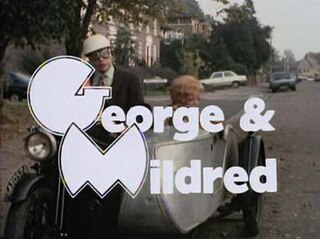
George and Mildred is a British sitcom produced by Thames Television and first aired between 1976 and 1979. It is a spin-off from Man About the House, and starred Brian Murphy and Yootha Joyce as constantly-sparring married couple George and Mildred Roper. The premise of the series had George and Mildred leaving their flat as depicted in Man About the House and moving to a modern, upmarket housing estate in Hampton Wick. Their arrival horrifies their snobbish neighbour Jeffrey Fourmile, a middle-class estate agent who fears the Ropers' presence will devalue his home.
David Peter Renwick is an English author, television writer, actor, director and executive producer. He created the sitcom One Foot in the Grave and the mystery series Jonathan Creek. He was awarded the Writers Guild Ronnie Barker Award at the 2008 British Comedy Awards.
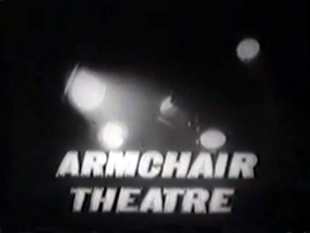
Armchair Theatre is a British television drama anthology series of single plays that ran on the ITV network from 1956 to 1974. It was originally produced by ABC Weekend TV. Its successor Thames Television took over from mid-1968.
The Sketch Show is a British television sketch comedy programme, featuring many leading British comedians. It aired on ITV between 2001 and 2004. The show was first commissioned in 2001 and was co-produced by a company owned by Steve Coogan. Despite the first series winning the BAFTA Television Award for Best Comedy, the second series was cancelled due to poor viewing figures. Lee Mack states in his autobiography Mack The Life that the final two episodes have never been broadcast.
Captain Kremmen was a British science fiction comedy radio serial set in the early 21st century. It was written and performed for Capital Radio by the DJ Kenny Everett, beginning in 1976. It was also broadcast on Liverpool's Radio City and Nottingham's Radio Trent in the early 1980s. It featured the eponymous vain and dimwitted spaceship captain. Everett took the name Kremmen from a series of American radio comedy discs called "Superfun" produced by Mel Blanc and his son, Noel. One of the regulars in the series was voice actor Bob Arbogast, and he came up with Kremmen, as a fictitious brand name for spoof commercials. These were heard by Everett in his Radio London days, and he revived the name for his space captain, and used some of the Superfun spoof ads in the Kremmen series. Each episode began with an introduction by Patrick Allen.
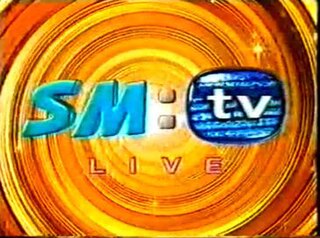
SMTV Live was a British Saturday morning children's television programme, produced by Blaze Television for ITV. Operating on a similar format to other Saturday morning programmes for children, such as BBC's Live & Kicking, the programme premiered on 29 August 1998 and ran for over 270 episodes across five years, before its conclusion on 27 December 2003.

Beryl Elizabeth Reid was a British actress. She won the 1967 Tony Award for Best Actress in a Play for The Killing of Sister George, the 1980 Olivier Award for Best Comedy Performance for Born in the Gardens, and the 1982 BAFTA TV Award for Best Actress for Smiley's People. Her film appearances included The Belles of St. Trinian's (1954), The Killing of Sister George (1968), The Assassination Bureau (1969), and No Sex Please, We're British (1973).

Teddington Studios was a large British television studio in Teddington, London Borough of Richmond upon Thames, providing studio facilities for programmes airing on the BBC, ITV, Channel 4, Channel 5, Sky1 and others. The complex also provided studio space for channel continuity. Towards the end of its history the site was run by the Pinewood Studios Group.
The Benny Hill Show is a British comedy television show starring Benny Hill that aired on the BBC and ITV between 15 January 1955 and 1 May 1989. The show consisted mainly of sketches typified by slapstick, mime, parody, and double entendre.

Wood and Walters is a British television comedy sketch show starring Julie Walters and Victoria Wood for Granada Television and written entirely by Wood. The show was short-lived, with one pilot in 1981 and a series of seven shows in 1982.

Robin Houston is a British voiceover artist and former announcer, radio and television newsreader and quiz show host. After starting his career as an announcer and stage manager, he became one of the pioneers of commercial radio in the United Kingdom. He went on to read the news on television for 15 years and to become one of the most well known announcers in television entertainment. For many years he was a host of television quiz shows, and is now a veteran voiceover artist with over 50 years' experience in the field.
The Kenny Everett Television Show is a comedy sketch show broadcast on BBC1 from 24 December 1981 to 18 January 1988. It was presented by its main performer Kenny Everett, who wrote the material with Barry Cryer and Ray Cameron. Later in 1986 they were joined by writing team Andrew Marshall and David Renwick after Cameron's departure the previous year. It was similar in style to Everett's previous programme The Kenny Everett Video Show, broadcast on ITV from 1978 to 1981, but with greater emphasis on comedy sketches than musical numbers. However, each edition would still have at least one music act. A total 47 episodes, including 6 Christmas specials and 2 compilations over 5 series, were produced by the BBC, broadcast between 24 December 1981 and 18 January 1988 inclusive.
This is a timeline of the history of the British television company ABC Weekend TV, one of the first four contractors of the Independent Television network.












